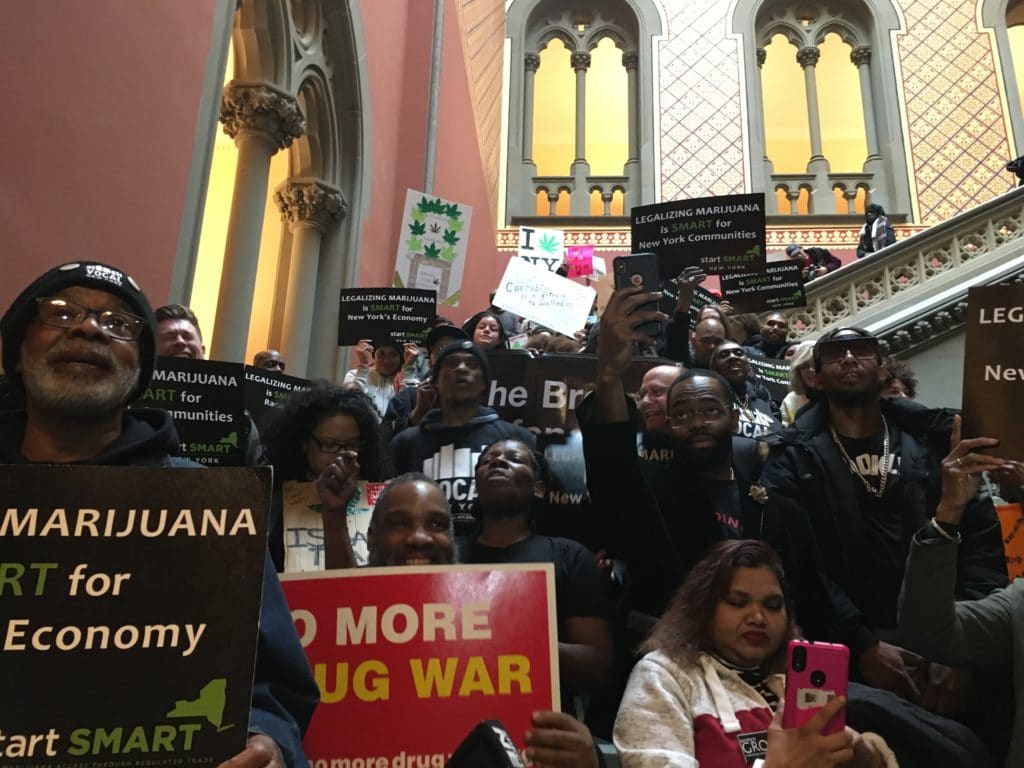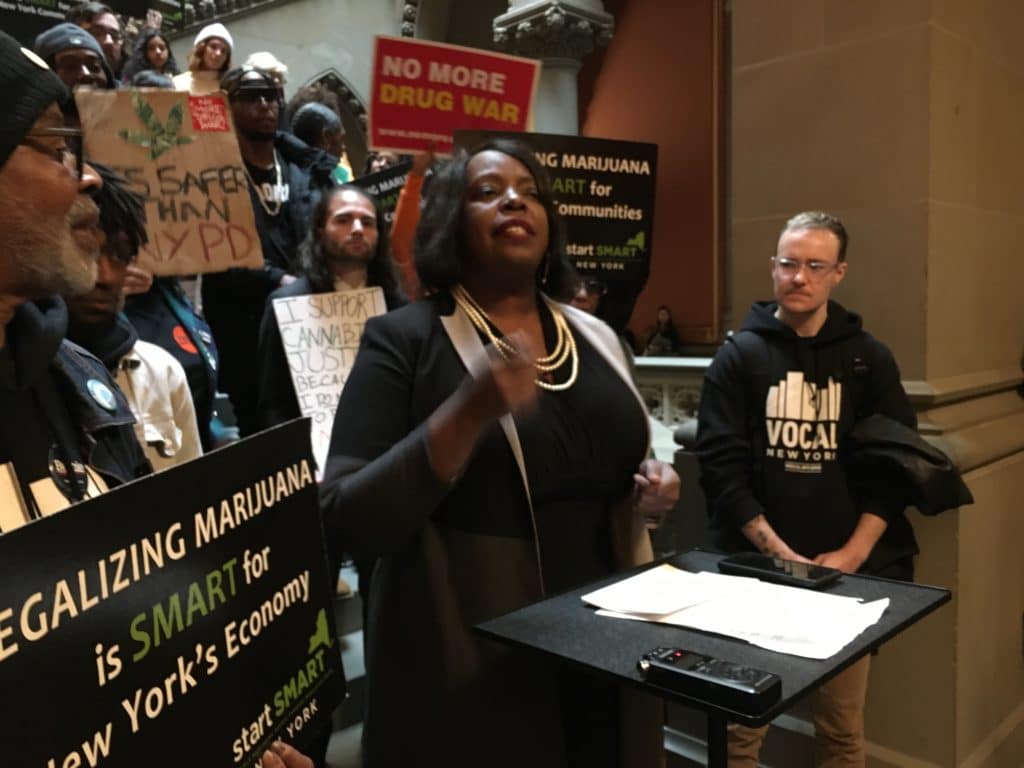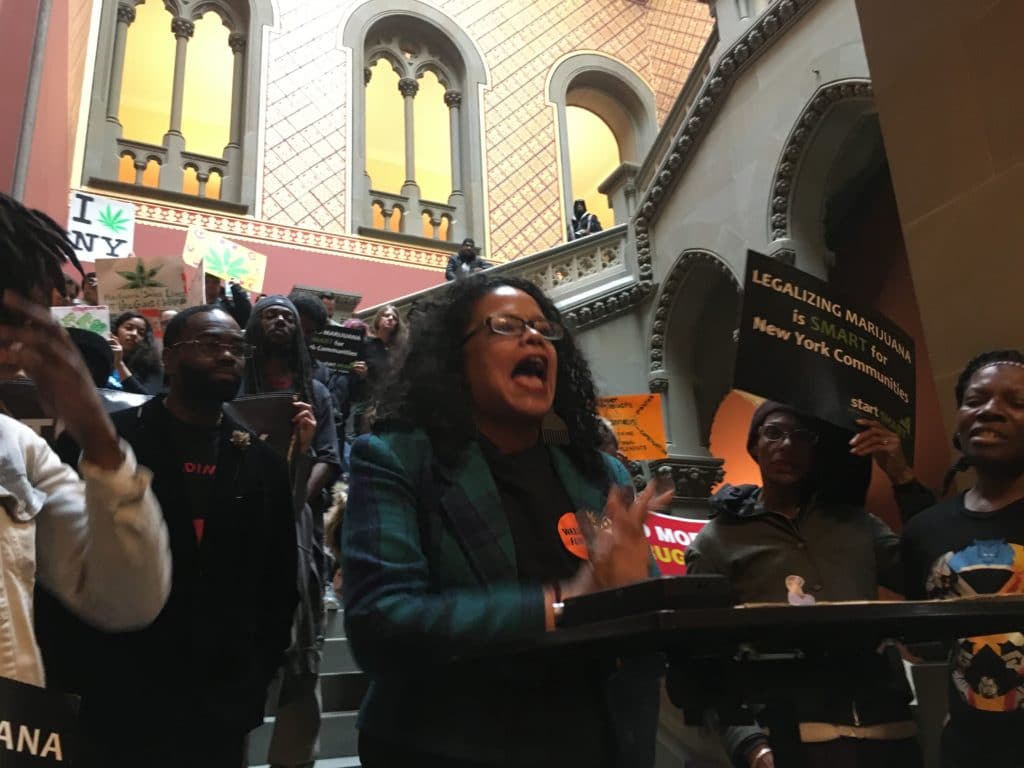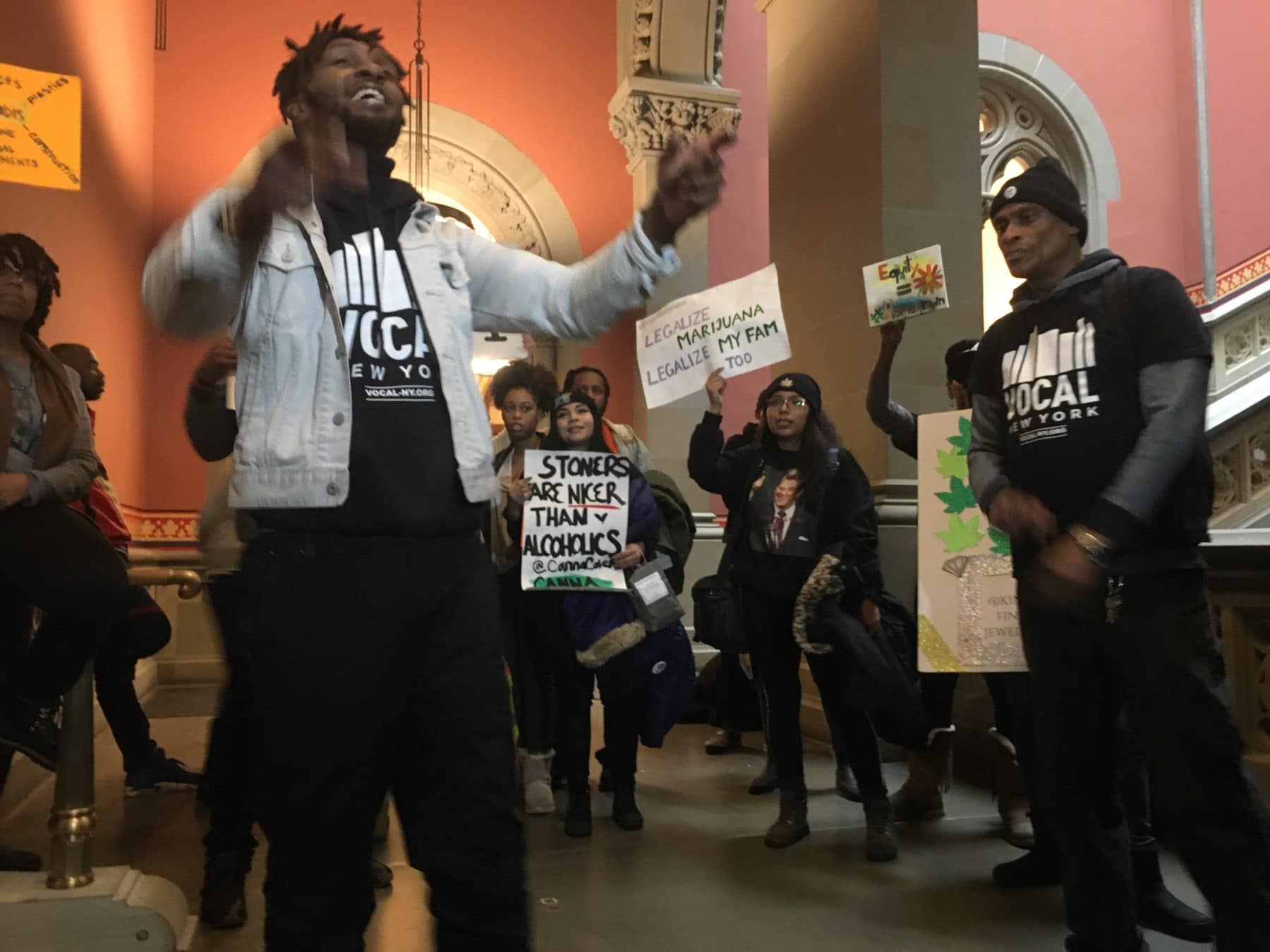The sun was absent on a bitter morning in New York City on January 28. I trudged across a deserted 14th Street to find a sleek black coach on the corner, stuffed to the brim with a diverse collection of New Yorkers, their faces pinched against the cold.
We set off through Manhattan’s empty streets and on the 150-mile drive up the Hudson River to Albany. The group was heading to the capital, along with other activists from all corners of the state, to lobby lawmakers in the New York Assembly and Senate for marijuana legalization and drug war reparations.
“We always talked about doing this, but we finally decided to take action this year,” said Beez, co-founder of lifestyle brand Cannacoven. She and her business partner were doing this for the first time. “It’s overwhelming for me, coming from California where everything is so casual, to New York where we have to fight for everything. Legalization in New York is the dream—but miracles happen every day!”
It’s a pivotal moment for marijuana reform in the Empire State. “For decades, communities of color were disproportionately affected by the unequal enforcement of marijuana laws,” Governor Andrew Cuomo (D) said a few weeks earlier in his State of the State address. “Let’s legalize adult use of marijuana.”
But as the new legislative session gets going, memories of the last session are fresh in New Yorkers’ minds. Lawmakers seemed poised to pass a landmark marijuana legalization proposal, but at the last minute the effort fell apart after squabbling over how tax revenues would be allocated.
“We are happy to see this is on the Governor’s agenda,” said Jawanza Williams, lead organizer for VOCAL-NY, after we finally arrived in the basement cafeteria of the legislative buildings. VOCAL-NY and the Drug Policy Alliance* helped organize this lobby day as part of their START SMART NY campaign.
“But we are crystal clear,” he continued. “The Senate, Assembly and governor has to center the needs and experiences of people who have experienced the burdens of problematic enforcement. Any legislation that passes this year has to address the historic crimes of prohibition and undo its collateral consequences in our communities.”
On January 21, Cuomo’s office released its Fiscal Year 2021 budget that includes its marijuana legalization proposal. The proposal revives the Cannabis Regulation and Taxation Act, which failed to pass last year, with some minor changes. The Act would impose three different taxes on cannabis cultivation and retail distribution and sales. It would also create a dedicated Office of Cannabis Management that would regulate all production and sales in the state, including its existing medical marijuana program.
But the activists who gathered in Albany are demanding much more. The governor’s proposal excludes any community reinvestment measures or language to ensure equity in business ownership for marginalized people in a highly segregated and exclusive industry. Cannabis-legal states like Massachusetts, California and Illinois have implemented various programs to try to address this, with varying success.
New York cannabis activists’ own proposal, the Marihuana Regulation and Taxation Act (MRTA), is the latest version of a bill that Manhattan Senator Liz Krueger (D-28th District) first proposed in 2013. It specifies how the state would create a social equity program, support small farmers and businesses, and allow for cannabis record expungement and re-sentencing.
https://www.youtube.com/watch?v=9p7hSnPuIPo&feature=youtu.be
After gathering, the activists split up into small groups, based on their city or town, to find the offices of their specific representatives. I walked with the “Brooklyn” group as we crisscrossed the dreary halls of the legislative building. At each office, the activists introduced themselves to lawmakers’ aides and dropped off pamphlets detailing their proposed legislation.
The team lead, a woman named Saki, studied a list identifying which lawmakers were in favor or opposed to legalization. Activists thanked the former group for their support and urged the latter to consider signing on. The group didn’t meet directly with any lawmakers, who typically require a scheduled appointment.
The real action started around 1 pm, when all the activists regrouped in the New York State Capitol, a massive neo-Renaissance marvel more like a Roman church than a government center.
At the foot of the building’s “Million Dollar Staircase,” a flash mob broke out on the marble floor. The group chanted:
“What do we want?”
“Marijuana justice!”
“Where do we want it?”
“In the budget!”
Activists waved signs and danced while government workers in drab suits stared with blank faces. More protesters spilled in from the hallways as reporters pointed cameras at the action. The chanting crescendoed:
“Marijuana justice, AKA unity! Use that revenue to build our community!”

Organizers handed out more signs and directed people to crowd onto the staircase. They set up a podium at the first step, and Williams opened a press conference with cameras flashing in his face.
“We believe 2020 is the year we’re going to get marijuana legalization done,” he cried, “and we will show the rest of the country that New York knows how to do this the right way and center vulnerable people!” For the next hour, he introduced a cast of different speakers including lawmakers and community leaders.
“When you arrest people for marijuana, you are decapitating our communities and removing young black men and women from our families!” said Assemblymember Latrice Walker (D-55th District) of Brooklyn. “We are demanding you take these resources and put them back into our schools and communities. We recognize that in our cities with a severe homeless crisis, we can give people victimized by our backwards policing practices a decent place to live.”

“I know my community in East Harlem and Washington Heights has been targeted by prohibition,” added Pilar DeJesus, co-founder of ¡High Mi Madre!. “We need to remove the stigma from this plant and talk to our families about safety. I want to make sure my brothers and sisters can profit and learn and share this wealth with their families.”

After the rally on the staircase, the activists marched through the capitol building to spread the message. By 3 pm, most reconvened in the underground café where the day had begun, sharing stories over curry chicken and plantains.
As we waited for the buses to take us back to New York City, I asked some people about their experiences that day. David Hernandez of Manhattan, co-founder of Happy Munkey, was returning to Albany after lobbying last year in a two-foot snowstorm. This time he got to speak to two of his representatives: Senator Brian Benjamin (D-30th District) and Assemblymember Daniel O’Donnell (D-69th District).
“I had fruitful conversations with them,” he said. “O’Donnell was very receptive, Benjamin was more stand-offish. But they both seemed excited to meet actual constituents. New York is my hometown and is where I vote, and I want us to be as progressive as other states.”
Hernandez’s partner, Rosemary “Black Rose” Severino, had come to lobby for her first time. “There’s a lot of opportunities that us minorities could have, but first we have to educate ourselves,” she said. “There’s so much of the cannabis culture that politicians need to understand. There’s so many stories about marijuana they needed to hear, and today I was able to witness that. It was such an amazing experience.”
START SMART NY will be back in Albany on February 12 and throughout the spring. The New York state budget is due by the start of the next fiscal year on April 1, and activists are pushing for it to contain the reforms they want.
Their message was loud and clear. But are lawmakers listening?
*The Drug Policy Alliance has provided a restricted grant to The Influence Foundation, which operates Filter, to support a Drug War Journalism Diversity Fellowship.
Photos and video by Alexander Lekhtman/Filter.





Show Comments